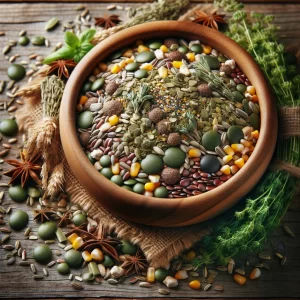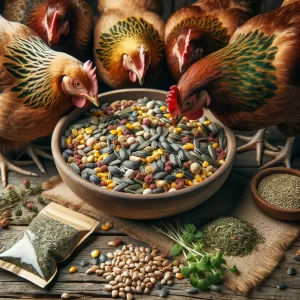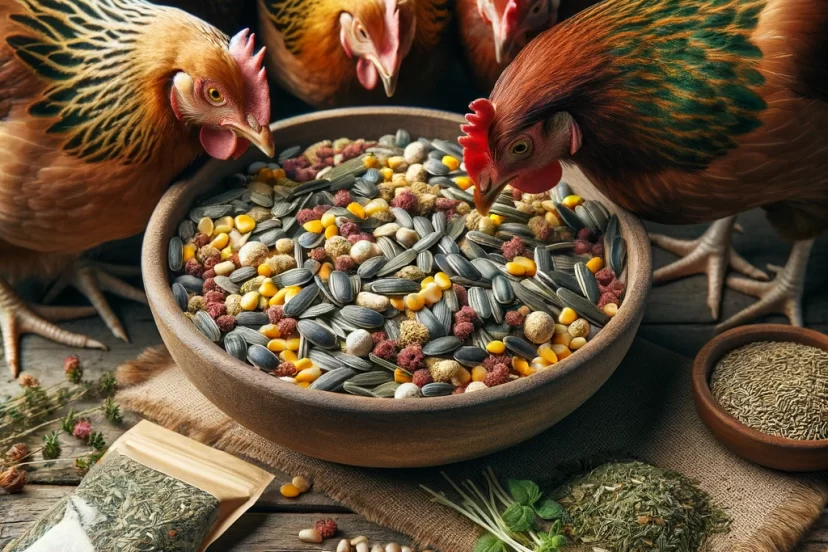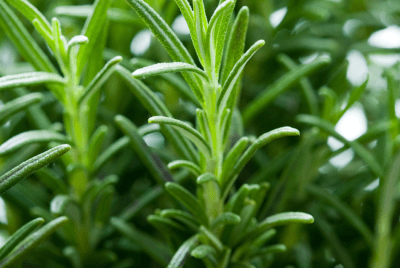Adding Dried Herbs in Chicken Feed Mix.
It’s no secret that the health and well-being of your flock is of utmost importance. Regarding keeping your chickens happy and thriving, dried herbs in chicken feed can provide a plethora of benefits. Not only do herbs offer natural sources of vitamins and minerals that can boost the overall health of your chickens, but they can also help to repel pests and parasites that may otherwise harm your flock. We have included the best chicken feeder for you below including an automatic chicken feeder to make things easy for you.

Key Takeaways:
- Boosts Immunity: Dried herbs like oregano and thyme are known to have immune-boosting properties that can help your chickens stay healthy.
- Natural Insect Repellent: Herbs like garlic and basil can act as natural insect repellents, protecting your chickens from pest infestations.
- Enhances Egg Quality: Adding herbs like parsley and dill to the feed mix can improve the flavor and quality of the eggs produced by your chickens.
- Antioxidant Benefits: Herbs like rosemary and sage are rich in antioxidants, which can help improve the overall well-being of your chickens.
- Reduces Stress: Chamomile and lavender are calming herbs that can help reduce stress in chickens, leading to better overall health and productivity.
Basics of Chicken Feed
Assuming you are new to raising chickens, understanding the basics of chicken feed is crucial for maintaining the health and productivity of your flock. Chicken feed is formulated to provide vital nutrients that chickens need to thrive, such as proteins, carbohydrates, fats, vitamins, and minerals.
Key Nutrients and Ingredients
One of the key nutrients in chicken feed is protein, which is vital for growth, feather development, and egg production in chickens. Additionally, carbohydrates serve as a source of energy, while fats help with nutrient absorption and provide insulation. Vitamins and minerals are also crucial for maintaining overall health and preventing nutrient deficiencies in chickens.
Understanding Commercial vs. Homemade Chicken Feed
An important aspect to consider when choosing chicken feed is whether to opt for commercial or homemade feed. Commercial chicken feed is formulated by experts to ensure a balanced diet for chickens, complete with vital nutrients. Homemade chicken feed, on the other hand, allows for more control over the ingredients used and can be a cost-effective option. However, it requires careful planning to ensure that chickens receive all the necessary nutrients for their well-being.

Benefits of Adding Dried Herbs
Health and Medicinal Benefits
Clearly, incorporating dried herbs into your chicken feed mix offers a spectrum of health and medicinal benefits for your poultry. An abundance of herbs such as oregano, thyme, and basil contain natural antimicrobial properties that can help prevent common poultry illnesses and maintain overall health. These herbs also boost the immune system of the chickens, reducing the need for antibiotics and promoting healthier growth.
Impact on Flavor and Quality of Poultry Products
Poultry enthusiasts can attest to the fact that proper seasoning can elevate the quality and flavor of poultry products significantly. Adding dried herbs to the chicken feed can impart a delightful aroma and taste to the meat and eggs produced. Herbs like sage and rosemary can infuse a unique and savory flavor profile while enhancing the nutritional value of the final product.
Plus, the inclusion of dried herbs can have a positive impact on the overall quality of poultry products. Consumers are increasingly drawn to products that are naturally seasoned and contain added health benefits, making your poultry stand out in the market.
Selecting the Right Herbs
Your chicken feed mix can greatly benefit from the addition of dried herbs, providing not only added nutrition but also flavor and potential health benefits. When choosing the right herbs to include in your chicken feed mix, it’s vital to consider the specific benefits they offer and ensure you are sourcing high-quality herbs.
Common Herbs and Their Specific Benefits
The inclusion of garlic in your chicken feed mix can help boost their immune system and keep parasites at bay. Oregano is known for its antibacterial and antiviral properties, which can promote overall health in your flock. Thyme is another beneficial herb that can aid in digestion and respiratory health for chickens. Parsley is high in vitamins and minerals, contributing to the overall well-being of your feathered friends.
How to Source Quality Dried Herbs for Feed
The key to sourcing quality dried herbs for your chicken feed mix is to ensure they are organic and free from pesticides or chemicals. Look for reputable suppliers who specialize in dried herbs for animal feed to guarantee the herbs’ purity and effectiveness. Consider sourcing herbs from local farmers or reputable online stores to ensure the quality of the product.
Specifically, when sourcing dried herbs for your chicken feed mix, opt for whole herbs rather than powders to ensure maximum potency and freshness. Whole herbs retain their vital oils and nutrients, providing greater benefits to your flock.

Preparing and Mixing Dried Herbs
Safe Preparation Practices for Herbs
For optimal results when adding dried herbs to your chicken feed mix, it is crucial to follow safe preparation practices. Ensure that the dried herbs you use are of high quality and are free from any mold or contaminants. It is advisable to source your herbs from reputable suppliers to guarantee their freshness and purity. Before incorporating them into the feed, inspect the herbs carefully to eliminate any debris or unwanted particles that could be harmful to your chickens’ health.
Mixing Techniques for Evenly Mixing Herbs Into Feed
Mixing dried herbs into chicken feed requires skill and precision to ensure that each chicken receives a balanced and consistent dose. Measure the appropriate amount of dried herbs according to the size of your flock and the desired health benefits. One effective technique is to mix the dried herbs with a small portion of the feed before gradually incorporating the mixture into the rest of the feed. This method helps to distribute the herbs evenly throughout the feed, preventing selective feeding by the chickens.
For optimal results, consider investing in a feed mixer or grinder to achieve a uniform distribution of herbs in the feed. The consistency of mixing is imperative to ensure that each chicken receives the necessary herbal supplements in every bite. By following these techniques, you can provide your flock with a well-balanced diet enriched with the benefits of dried herbs.
Feeding Guidelines and Considerations
Determining Proper Ratios of Herbs to Feed
All poultry owners aim to provide the best nutrition for their flock, and adding dried herbs to chicken feed can offer several benefits. When determining the proper ratios of herbs to include in their feed, poultry keepers should consider the size of their flock, the age of the chickens, and their specific health needs. It is crucial to create a balanced mix that provides the right amount of herbs without overwhelming the feed.
Most herb mixes for chicken feed contain a combination of herbs like oregano, thyme, parsley, and sage. A general guideline is to add around 1-2% of the total feed volume. Gradually increase or decrease the ratio based on how the flock responds. Always monitor your chickens’ health and behavior when introducing new herbs to their diet to ensure they are benefiting from the added herbs.
Potential Side Effects and Interactions to Watch For
Anytime you make changes to your chicken’s diet, there is always the potential for side effects or interactions to occur. While herbs are generally safe for chickens, some chickens may be allergic or sensitive to certain herbs. Common side effects include digestive upset, allergic reactions, or reduced egg production. If you notice any adverse effects after incorporating herbs into their feed, immediately remove the herbs. Also you can consult with a poultry veterinarian if you feel its necessary.
On the bright side, many herbs offer natural health benefits for chickens, such as improved digestion, immune system support, and insect-repelling properties. It is imperative to be mindful of the herbs you choose and their potential interactions with any existing medications or supplements your chickens may be receiving.

Monitoring the Effects of Herb-Enhanced Feed
Despite the potential benefits of enhancing chicken feed with dried herbs, it is crucial to monitor the effects of this change to ensure the health and well-being of your flock. By observing the short-term and long-term indicators of health, you can make informed decisions about the effectiveness of the herb-enhanced feed mix.
Short-Term and Long-Term Indicators of Health
Herb-Enhanced Feed: In the short term, observe your chickens for any immediate reactions to the new feed mixture. Signs of allergic reactions, digestive issues, or decreased appetite should be closely monitored. Long term, keep an eye on factors such as weight maintenance, egg production, and overall vitality of the flock. Any drastic changes in these indicators could signal a need for adjustments in the herb-enhanced feed composition.
Adjustments and Fine-Tuning the Feed Mixture
Effects: Monitor the effects of the herb-enhanced feed on your chickens. And, be prepared to make adjustments and fine-tune the feed mixture as needed. Consider consulting with a poultry nutritionist or veterinarian. So you can ensure that the herbs are being incorporated in appropriate quantities and combinations. It may take some trial and error to find the optimal formula that maximizes the benefits for your flock.
Feed: Pay attention to any significant changes in behavior, egg quality, or overall health of your chickens as you introduce herb-enhanced feed. Some adjustments may be necessary, be mindful not to make too many changes at once, as this can cause stress to the flock. Always prioritize the well-being of your chickens and seek professional guidance when needed.
Summing up Dried Herbs in Chicken Feed
So, adding dried herbs to your chicken feed mix can enhance the flavor of their diet. It also provides potential health benefits for your flock. Herbs like oregano, thyme, and parsley can boost their immune systems and contribute to overall well-being.
Other Articles You might Enjoy:
Protect your Chicken Coop From Racoons
Chicken Tractor for your Flock
Peppermint the ultimate rodent repellent
Herbs you can add To Your Chicken Feed
FAQ’s about Dried Herbs in Chicken Feed
Q: Why should I consider adding dried herbs to my chicken feed mix?
A: Adding dried herbs to your chicken feed mix can provide numerous health benefits for your chickens. Herbs are known to have antibacterial, antiparasitic, and immune-boosting properties, which can help keep your flock healthy and thriving.

Q: What are some common dried herbs that are safe and beneficial for chickens?
A: Some common dried herbs that are safe and beneficial for chickens include oregano, thyme, basil, parsley, sage, and mint. These herbs not only add flavor to the feed but also contribute to the overall health of the chickens.
Q: How should I introduce dried herbs into my chicken feed mix?
A: You can introduce dried herbs into your chicken feed mix by simply mixing them in with the feed. Start by adding small amounts and gradually increase the quantity as your chickens get used to the new addition. Make sure the herbs are finely ground to prevent selective eating.
Q: Can adding dried herbs to chicken feed improve egg quality?
A: Yes, adding dried herbs to chicken feed can improve egg quality. Certain herbs, such as oregano, have been shown to increase the yolk color, flavor, and nutritional content of eggs. Additionally, the antimicrobial properties of herbs can help reduce the risk of bacterial contamination in eggs.
Q: Are there any potential risks or side effects of adding dried herbs to chicken feed?
A: Dried herbs are generally safe for chickens. But, it is important to introduce them gradually and observe for any signs of digestive upset or allergic reactions. Also, some herbs may have medicational properties that could interact with certain medications. So if you feel uncertain consult with a poultry veterinarian before making significant changes to your chickens’ diet.
Q: What is the best chicken feeder to use?
A: The best chicken feeder to use is the one you feel works best for your flock. See the chart below for a selection to choose from, click on the one you like to view details.


























